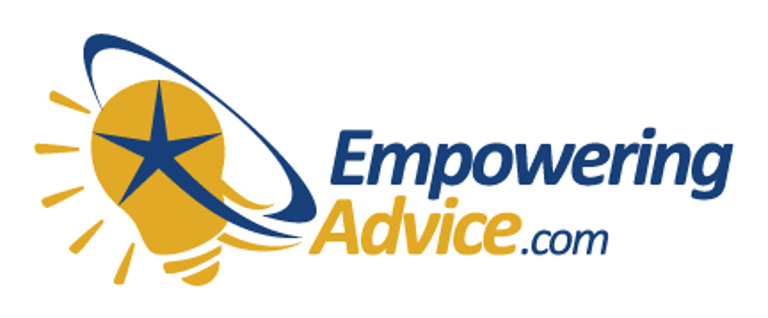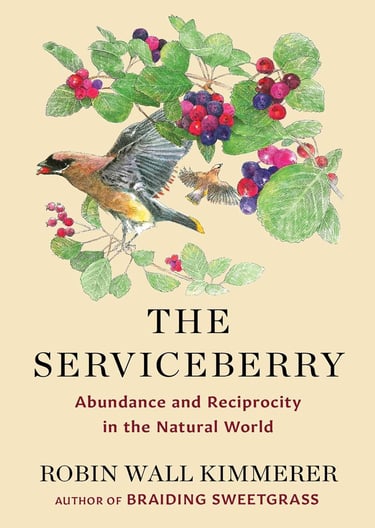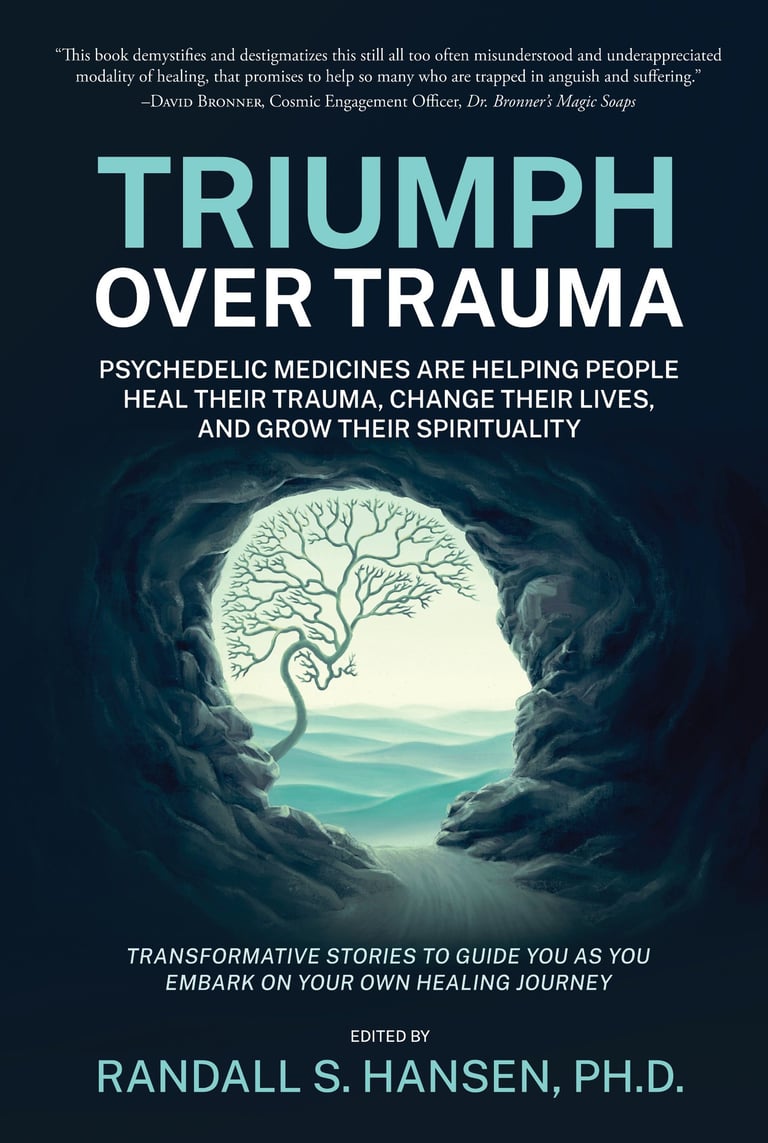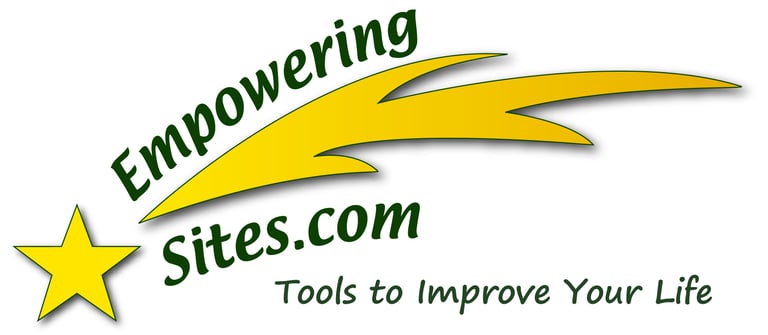Lessons We Can Learn From The Serviceberry
The Serviceberry: Abundance and Reciprocity in the Natural World, by Robin Wall Kimmerer. 2024. ISBN: 1668072246
Living in a world “where the currency of exchange is gratitude and the infinitely renewable resource of kindness,” where we celebrate gratitude, kindness, reciprocity, and community over selfishness, competition, and the hoarding of goods.
Imagine if we lived in a world not of scarcity, selfishness, and the accumulation of goods, but a world in which we lived around the concepts of gratitude, reciprocity, and community? A world where we did not celebrate billionaires, but instead lifted up everyone in the community with love and compassion, and the focus was on sharing the abundance.
This short and easy read (only 128 pages long) has the potential to profoundly impact how you view yourself, others, and the world at large.
I was enthralled with the book and its premise, but knowing the benefits of the serviceberry bush for the wildlife in my PNW forest, I had a liking of the book from the start. As the author states, "The tree is beloved for its fruits, for medicinal use, and for the early froth of flowers that whiten woodland edges at the first hint of spring."
Kimmerer states: "Serviceberries show us another model, one based on reciprocity rather than accumulation, where wealth and security come from the quality of our relationships, not from the illusion of self-sufficiency."
I don't know about your upbringing, but mine was filled with fears of scarcity, both with my folks fighting over money and spending constantly, as well as feeling deprived as the youngest who always got hand-me-downs from my older brothers.
Author Robin Kimmerer, no surprise, is an Indigenous scientist and author who brings both her cultural wisdom, but also the wisdom of the natural world. "In the traditional Anishinaabe economy, the land is the source of all goods and services, which are distributed in a kind of gift exchange: one life is given in support of another. The focus is on supporting the good of the people, not only an individual."
As I was reading the book, especially the parts about scarcity and hoarding, my mind went back a few years to the pandemic and the multitudes of people who rushed in and bought all the toilet paper and other necessities, and then either hoarding all the products or attempting to sell them at a very high markup. Meanwhile, the rest of us were left to scrounge around and make do.
In terms of our eating habits, Kimmerer laments that we no longer eat foods when they are locally in season, stating: "We force the food to come to us, at considerable financial and ecological costs, rather than following the practice of taking what has been given to us, each in its own time."
The author wants us to imagine a human economy that is more aligned with the natural world, what she refers to as a gift economy: "Gratitude and reciprocity are the currency of a gift economy. And they have the remarkable property of multiplying with every exchange."
I love this story she shares from Lewis Hyde in his book, The Gift, in which a hunter-gatherer community in Brazil was observed. One night, a hunter returns with a huge kill, far too much for his family alone. He could preserve and store the extra meat, but instead, he invites the community to feast with him and share in his good fortune. When asked why he didn't store and save the meat so his family could have more meals (food security), the hunter replied: "I store my meat in the belly of my brother."
How amazing if we all had this level of concern for others! When I had a flock of egg-laying chickens years ago, I followed this advice. In the summers, when eggs were abundant, I would give away dozens to my friends and neighbors, donating the remainder to the local food bank so that many could have access to perhaps one of the best foods available.
The author's proposal is to have us contemplate the possibilities of a gift economy – one in which connections and community grow through gratitude and relationships, not through the accumulation of wealth. For example, the hunter in the previous story would expect that some of his "brothers" would return the favor when they experienced a bountiful harvest or by offering services, such as helping with the building of a structure or the repair of a boat.
While this type of economy would never work at the national level, imagine how it might work locally. Instead of thinking of everything as "mine," or thinking that “I better get mine today before it's all gone,” can you contemplate a situation where people openly share with others in their community? As the author states: "The prosperity of the community grows from the flow of relationships, not the accumulation of goods."
Many of us live within some form of a market economy – which is all about the manufacturing and distribution of goods and the power of supply and demand, often with the notion of scarcity (lack of supply) hanging in the balance. Scarcity affects pricing and impacts who can afford the goods. In terms of food security, we each try to control our own supplies by private accumulation and storage.
The book is nicely illustrated and one of the pictures caught my eye; it was of a small book display, mounted on a pole, which immediately made me think of the Little Free Library movement, a program that promotes neighborhood book exchanges, usually in the form of a public bookcase. I ran one of these at my house years ago and was absolutely amazed at how popular it became and how many people kept donating popular best-sellers to the point that I had a constant supply of excess books stored in my garage.
As she is wrapping up, Kimmerer shares a beautiful and powerful message: "I want to be part of a system in which wealth means having enough to share, and where the gratification of meeting your family needs is not poisoned by destroying the possibility for someone else. I want to live in a society where the currency of exchange is gratitude and the infinitely renewable resource of kindness, which multiplies every time it is shared, rather than depreciating with use."
The author also shares a quote from Charles Eisenstein in his book, Sacred Economics: "The next stage of human economy will parallel what we are beginning to understand about nature. It will call forth the gifts of each of us; it will emphasize cooperation over competition; it will encourage circulation over hoarding; and it will be cyclical, not linear."
In the final pages of the book, Kimmerer invites us all to join the gift economy – in whatever small or large way we can.
The Serviceberry is small but mighty – and packs a punch to contemplate. Do we all want to live in our individual silos, always guarding what is ours, worrying about whether we will get ours before others get theirs, or do we want to live in community, where we support one another, sharing our gifts, but also living in love, kindness, and compassion? In other words, what is it you value?
I know how I want to live… in the rhythm of nature, following the lessons of nature, generously supporting and serving my brothers and sisters with love and compassion.
Find more book reviews and advice for living a happy, healthy, and healing life here.
Dr. Randall Hansen is an evangelist, educator, and thought-leader... helping the world heal from past trauma and the poor food system. He is founder and CEO of EmpoweringSites.com, a network of empowering and transformative Websites, including EmpoweringAdvice.com.
He is the author of the groundbreaking Triumph Over Trauma: Psychedelic Medicines are Helping People Heal Their Trauma, Change Their Lives, and Grow Their Spirituality and the well-received HEAL! Wholeistic Practices to Help Clear Your Trauma, Heal Yourself, and Live Your Best Life.
The third book in the Wholeistic Healing Trilogy is the game-changing The HEALing Revolution Diet: A Science-based Approach to Heal Your Gut, Reverse Chronic Illnesses, Lose Weight, Clear Your Mind, and Increase Longevity.
Dr. Hansen's focus and advocacy center around true health and healing journeys that results in being able to live an authentic life filled with peace, joy, love. Learn more by visiting his personal Website, RandallSHansen.com. You can also check out Dr. Randall Hansen on LinkedIn.








